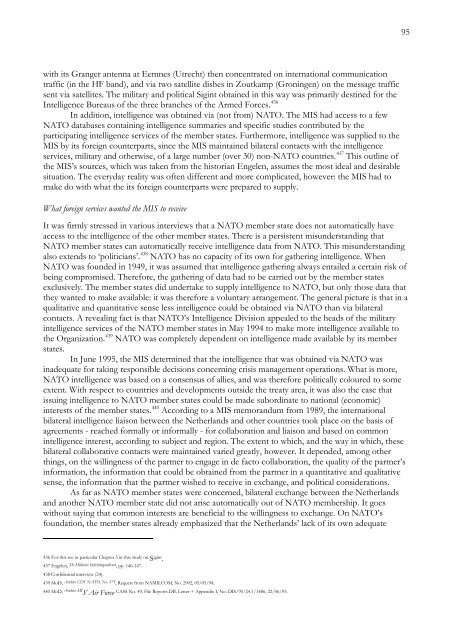C. Wiebes - Intelligence en de oorlog in Bosnië 1992-1995. De rol van de inlichtingen- en veiligheidsdiensten - Engels
C. Wiebes - Intelligence en de oorlog in Bosnië 1992-1995. De rol van de inlichtingen- en veiligheidsdiensten - Engels
C. Wiebes - Intelligence en de oorlog in Bosnië 1992-1995. De rol van de inlichtingen- en veiligheidsdiensten - Engels
- No tags were found...
You also want an ePaper? Increase the reach of your titles
YUMPU automatically turns print PDFs into web optimized ePapers that Google loves.
95with its Granger ant<strong>en</strong>na at Eemnes (Utrecht) th<strong>en</strong> conc<strong>en</strong>trated on <strong>in</strong>ternational communicationtraffic (<strong>in</strong> the HF band), and via two satellite dishes <strong>in</strong> Zoutkamp (Gron<strong>in</strong>g<strong>en</strong>) on the message traffics<strong>en</strong>t via satellites. The military and political Sig<strong>in</strong>t obta<strong>in</strong>ed <strong>in</strong> this way was primarily <strong>de</strong>st<strong>in</strong>ed for the<strong>Intellig<strong>en</strong>ce</strong> Bureaus of the three branches of the Armed Forces. 436In addition, <strong>in</strong>tellig<strong>en</strong>ce was obta<strong>in</strong>ed via (not from) NATO. The MIS had access to a fewNATO databases conta<strong>in</strong><strong>in</strong>g <strong>in</strong>tellig<strong>en</strong>ce summaries and specific studies contributed by theparticipat<strong>in</strong>g <strong>in</strong>tellig<strong>en</strong>ce services of the member states. Furthermore, <strong>in</strong>tellig<strong>en</strong>ce was supplied to theMIS by its foreign counterparts, s<strong>in</strong>ce the MIS ma<strong>in</strong>ta<strong>in</strong>ed bilateral contacts with the <strong>in</strong>tellig<strong>en</strong>ceservices, military and otherwise, of a large number (over 30) non-NATO countries. 437 This outl<strong>in</strong>e ofthe MIS’s sources, which was tak<strong>en</strong> from the historian Engel<strong>en</strong>, assumes the most i<strong>de</strong>al and <strong>de</strong>sirablesituation. The everyday reality was oft<strong>en</strong> differ<strong>en</strong>t and more complicated, however: the MIS had tomake do with what the its foreign counterparts were prepared to supply.What foreign services wanted the MIS to receiveIt was firmly stressed <strong>in</strong> various <strong>in</strong>terviews that a NATO member state does not automatically haveaccess to the <strong>in</strong>tellig<strong>en</strong>ce of the other member states. There is a persist<strong>en</strong>t misun<strong>de</strong>rstand<strong>in</strong>g thatNATO member states can automatically receive <strong>in</strong>tellig<strong>en</strong>ce data from NATO. This misun<strong>de</strong>rstand<strong>in</strong>galso ext<strong>en</strong>ds to ‘politicians’. 438 NATO has no capacity of its own for gather<strong>in</strong>g <strong>in</strong>tellig<strong>en</strong>ce. Wh<strong>en</strong>NATO was foun<strong>de</strong>d <strong>in</strong> 1949, it was assumed that <strong>in</strong>tellig<strong>en</strong>ce gather<strong>in</strong>g always <strong>en</strong>tailed a certa<strong>in</strong> risk ofbe<strong>in</strong>g compromised. Therefore, the gather<strong>in</strong>g of data had to be carried out by the member statesexclusively. The member states did un<strong>de</strong>rtake to supply <strong>in</strong>tellig<strong>en</strong>ce to NATO, but only those data thatthey wanted to make available: it was therefore a voluntary arrangem<strong>en</strong>t. The g<strong>en</strong>eral picture is that <strong>in</strong> aqualitative and quantitative s<strong>en</strong>se less <strong>in</strong>tellig<strong>en</strong>ce could be obta<strong>in</strong>ed via NATO than via bilateralcontacts. A reveal<strong>in</strong>g fact is that NATO’s <strong>Intellig<strong>en</strong>ce</strong> Division appealed to the heads of the military<strong>in</strong>tellig<strong>en</strong>ce services of the NATO member states <strong>in</strong> May 1994 to make more <strong>in</strong>tellig<strong>en</strong>ce available tothe Organization. 439 NATO was completely <strong>de</strong>p<strong>en</strong>d<strong>en</strong>t on <strong>in</strong>tellig<strong>en</strong>ce ma<strong>de</strong> available by its memberstates.In June 1995, the MIS <strong>de</strong>term<strong>in</strong>ed that the <strong>in</strong>tellig<strong>en</strong>ce that was obta<strong>in</strong>ed via NATO was<strong>in</strong>a<strong>de</strong>quate for tak<strong>in</strong>g responsible <strong>de</strong>cisions concern<strong>in</strong>g crisis managem<strong>en</strong>t operations. What is more,NATO <strong>in</strong>tellig<strong>en</strong>ce was based on a cons<strong>en</strong>sus of allies, and was therefore politically coloured to someext<strong>en</strong>t. With respect to countries and <strong>de</strong>velopm<strong>en</strong>ts outsi<strong>de</strong> the treaty area, it was also the case thatissu<strong>in</strong>g <strong>in</strong>tellig<strong>en</strong>ce to NATO member states could be ma<strong>de</strong> subord<strong>in</strong>ate to national (economic)<strong>in</strong>terests of the member states.440Accord<strong>in</strong>g to a MIS memorandum from 1989, the <strong>in</strong>ternationalbilateral <strong>in</strong>tellig<strong>en</strong>ce liaison betwe<strong>en</strong> the Netherlands and other countries took place on the basis ofagreem<strong>en</strong>ts - reached formally or <strong>in</strong>formally - for collaboration and liaison and based on common<strong>in</strong>tellig<strong>en</strong>ce <strong>in</strong>terest, accord<strong>in</strong>g to subject and region. The ext<strong>en</strong>t to which, and the way <strong>in</strong> which, thesebilateral collaborative contacts were ma<strong>in</strong>ta<strong>in</strong>ed varied greatly, however. It <strong>de</strong>p<strong>en</strong><strong>de</strong>d, among otherth<strong>in</strong>gs, on the will<strong>in</strong>gness of the partner to <strong>en</strong>gage <strong>in</strong> <strong>de</strong> facto collaboration, the quality of the partner’s<strong>in</strong>formation, the <strong>in</strong>formation that could be obta<strong>in</strong>ed from the partner <strong>in</strong> a quantitative and qualitatives<strong>en</strong>se, the <strong>in</strong>formation that the partner wished to receive <strong>in</strong> exchange, and political consi<strong>de</strong>rations.As far as NATO member states were concerned, bilateral exchange betwe<strong>en</strong> the Netherlandsand another NATO member state did not arise automatically out of NATO membership. It goeswithout say<strong>in</strong>g that common <strong>in</strong>terests are b<strong>en</strong>eficial to the will<strong>in</strong>gness to exchange. On NATO’sfoundation, the member states already emphasized that the Netherlands’ lack of its own a<strong>de</strong>quate436 For this see <strong>in</strong> particular Chapter 5 <strong>in</strong> this study on S ig<strong>in</strong>t .437 Engel<strong>en</strong>, <strong>De</strong> Militaire Inlicht<strong>in</strong>g<strong>en</strong>di<strong>en</strong>st, pp. 146-147.438 Confid<strong>en</strong>tial <strong>in</strong>terview (24).439 MoD, Archive CDS NATO, No. 375, Request from NAMILCOM, No. 2902, 05/05/94.440 MoD, Archive MI S / Air Force , CASS No. 49, File Reports DB, Letter + App<strong>en</strong>dix I, No. DIS/95/24.1/1486, 22/06/95.





